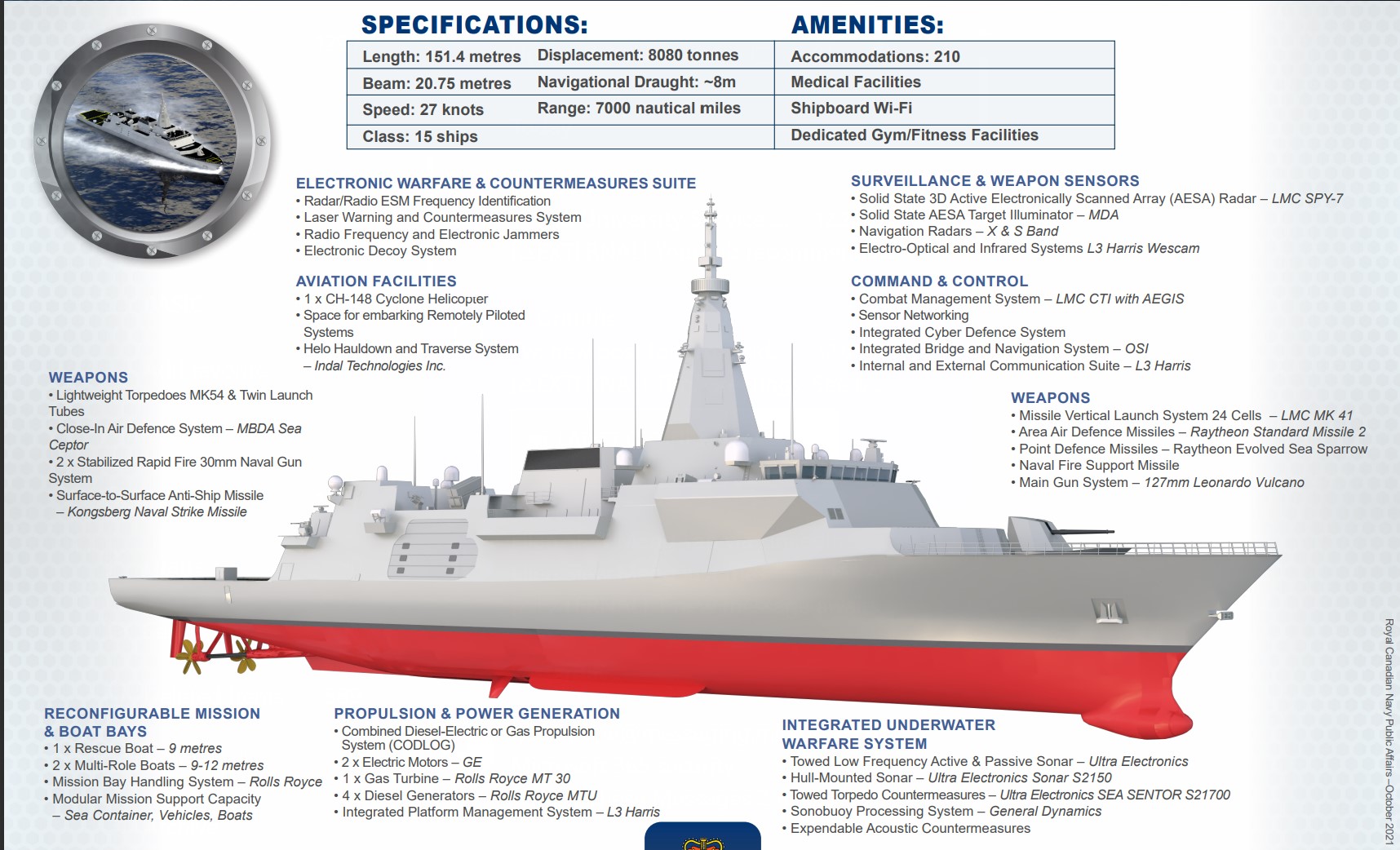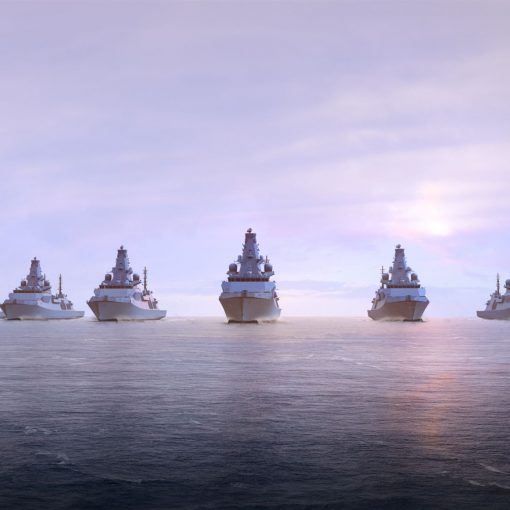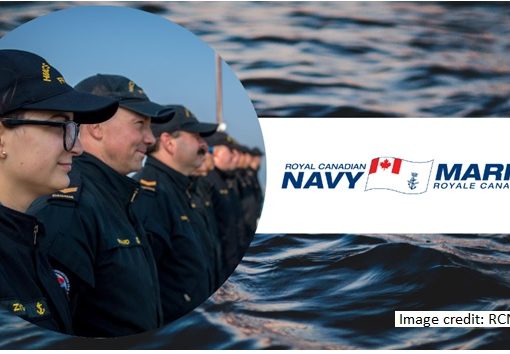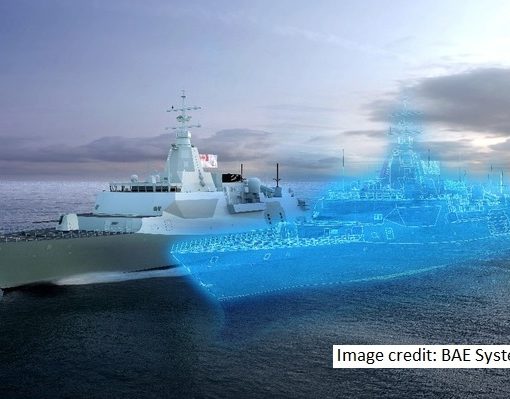By Dan Middlemiss, 1 September 2023
Several interesting questions about different aspects of the National Shipbuilding Strategy (NSS) and its programs have arisen in recent threads in this Broadsides Forum, and the answers have been either contentious or difficult to resolve on the basis of current information.
These prompted me to ponder what information Canadians should have a reasonable right to receive about the NSS and its associated procurement programs: what? from whom, and how frequently? In addition, we could ask how well Canada fares in this regard when compared to other western states with similar shipbuilding strategies. The United Kingdom and Australia immediately spring to mind, but we could also include the United States for the sake of comparison.
I have been trying to stay current with the latest developments in our NSS, and I have also spent a great deal of time over the years researching several of Canada’s previous major naval procurement programs. But as our readers know, information is often hard to come by, and close attention to government announcements and reports, academic and industry studies, journal articles, media reports, and for some of us, even a resort to Access to Information requests are required in attempt for us to keep up, and even then it is a struggle to make sense of the results.
So, my question to this Forum is the following: if you could have your top questions answered about the NSS and its programs, what would they be? Who do you think should be the appropriate source to provide the answers?
To provide some examples of what I mean, here are a few of my top choices.
1. Is the current NSS approach sustainable in the long term? What is meant by sustainable and what conditions have to apply for the NSS to be successful? (Sufficient domestic demand? Supplementary export orders? Continued government funding and other support?) In my opinion, this question should have been rigorously investigated by a reputable, independent, third party organization like the RAND Corporation before the NSS was announced. Australia and the United Kingdom have done so via RAND studies, augmented by parliamentary hearings and reports, and by other third party reports.
2. What was the government’s reasoning for its quick about-face on its stated policy in June 2016 to seek a mature and existing design for the CSC? The answer to this could shed light on Canadian defence industry lobbying, but would probably have to rely on media interviews because of cabinet confidentiality rules.
3. How much, and in what ways, has the RCN changed its design requirements for the CSC since the basic design competition ended and LMC was selected in October 2018?
4. When the CSC contract is finally signed, what is the government’s best estimate of the full costs and anticipated delivery schedule for the total number of ships to be procured? Other states’ governments have provided this type of information and have updated that information fairly regularly. I hope Canada will as well.
5. On how many occasions has the federal cabinet been briefed by DND and Public Services and Procurement Canada on the cost, quantity, and scheduled delivery details of the CSC? In my experience, given cabinet secrecy conventions, this type of information probably could only be obtained via Access to Information requests, and these can be costly and usually entail significant time delays. This might seem like a trivial question, but in researching past major warship procurements, I have been struck by just how seldom such important matters come before the full cabinet for discussion and ultimately decisions. Indeed, during the DDH-280 class procurement process, oftentimes the DND minister and even the senior officers of the RCN were being provided with only partial (or misleading) information, while at other times they had crucial material withheld from them. When billions of dollars and careers are at stake, history has demonstrated that political and bureaucratic games abound. Therefore, this type of information might help to reassure Canadians that our political leaders were being kept informed about progress of the NSS and its relevant programs in an open and transparent manner.
6. Finally, the real core issue is: do Canadians really care one way or the other? Ottawa appears to think not, and I can point you to recent comments by very senior retired DND types who lament that they think not as well. Perhaps in the end, our PM, government leaders, and Canadians themselves share this sentiment, namely they expect the United States to defend Canada in a pinch in any case, but do not want to admit that out loud.
I am sure that Forum readers will have different questions that they would like answered, so please weigh in.






13 thoughts on “Informing Canadians”
Hello Dan. One of the biggest difficulties with the National Shipbuilding Strategy (NSS) and its programs has been the lack of information and regular updates. I believe this is by design from the Canadian government to purposefully keep these naval programs from the Canadian public at large. The US government has always been much more forthcoming with frequent updates with status reports on all of their naval shipbuilding programs through their Congressional Research Service Reports including the USS Constellation class program status. Canada does not fare well at all in comparison to our other allies including the US, UK and Australia, to keep their citizens regularly informed. Canadians should not have to “pull hen’s teeth” to access information on government NSS programs. Yes, by all means, do not divulge any “true” National or Allied “secrets”, but do give “appropriate” updates to the taxpayer and others with regard to how the NSS is progressing (or not). The government has been much too secretive and that is the main dubious reason why the NSS has been failing the Canadian public and needs to be regularly updated in order to survive. The media or public should not have to go through the Access To Information process in order to attempt to find out what the government is doing (or not doing) with the NSS program and in my opinion will fail miserably if not corrected soon.
My comments re your post include:
1) Having a third-party input study from organizations like the RAND Corporation would be a good start. It would be responsible to Parliament for recommendations to improve the productivity of the NSS program. This government secrecy is not helping and should be restructured to provide all Canadians with real and timely updates with respect to the CSC Type 26 Frigates in particular, as well as including other programs like JSS, AOPS, CCG ship replacements, any submarine and Kingston class replacement programs along with any future naval programs or capabilities governments may be considering.
2). In my opinion, the Canadian government was always looking for the CSC Type 26 Frigate program to be the final winner of the competition as the other mature or existing designs were not as “future-proofed” as the UK BAE Type 26 Frigate. In retrospect, they were probably correct on that front. Canadian defence industries lobbying for these existing designs would more than likely cost the government Billions CAD more in the end as well.
3). Yes, the Royal Canadian Navy (RCN) has significantly changed its design requirements for the CSC Frigate with Lockheed Martin Corporation (LMC) which has resulted in a heavier CSC than the original City class Type 26 version and probably why Irving Shipbuilding Limited (ISL) asked for the extra funds to help build this “frigate”. Hopefully naval architects can balance these issues before contracts are signed.
4). During the procurement design processes for both the DDH 280 class and Halifax class, this misleading information again raised its ugly head which lead to these Canadian designed and built ships being “orphaned” classes from the start. The Canadian government did not want that to happen again, so they went with a “paper design” with the BAE Type 26 Frigate rather than a mature frigate design such as the FREMM class which would not have been built here in Canada.
5). Do Canadians really care about National Defence? Probably not as you say, however having a less secretive NSS program that is regularly updated for Canadian “exposure” will certainly help.
Some of my questions would be:
1). What AESA solid state “X” Band Illumination Radar for weapons Targeting/Surface Surveillance will MacDonald Detwiller Associates (MDA) develop for for the CSC Frigate? Will it be as robust as the Thales Sea Fire 500 “X” Band Illumination Radar or will MDA acquire this design and “Canadianize” it?
2.) Will Canada acquire a High Energy Laser (HEL) Directed Energy Weapon (DEW) system as the UK has already done for their version of the BAE Type 26 Frigate or perhaps acquire the US-AN/SEQ 3 DEW system. What kind of power upgrades would then be required?
3). Will Canada “stand-up” a Canadian “Report To Parliament” reporting system for all CAF projects or NSS programs, such as the US Reporting System to Congress on the status of all defence projects?
4). Will all the MK 41 VLS Cells be Extended Range Cells and will Canada consider re-instating a 32 Cell MK 41 VLS System forward?
5). Will Canada finally join the Ballistic Missile Defence (BMD) program for the RCN along with the Cooperative Engagement Capability (CEC)?
6). Can the CSC Frigate be successfully extended by 10 meters midships forward of the Multi-Mission Bay (MMB) deck to accommodate more missile systems (Another 32 MK 41 VLS System: another 24 Sea Ceptor VLS Cells and another 8 x NSMs as the Constellation class already has) or will Canada ”tail up” with the future UK Type 83 Destroyer program for up to 4 CSC “Destroyers” and then down-grade the CSC Frigate requirements from 15 down to 12 Frigates?
The Canadian Government in all departments are extremely secretive. Everything, and I mean EVERYTHING is filtered through the lens of message handling. Absolutely nothing must be released to the Canadian public that may put the government of the day in a poor light. As a result the entire machinery of government has both sand and spanners in the gears.
I will give you some links from concerned Canadians about the lack of information from the government on any and all topics
https://wesleywark.substack.com/p/the-government-responds-to-the-rouleau
https://wesleywark.substack.com/p/the-brits-do-it-covid-lessons-that
https://theline.substack.com/p/jen-gerson-i-asked-some-questions
https://paulwells.substack.com/p/dire-straits
https://paulwells.substack.com/p/free-radicals
https://paulwells.substack.com/p/a-poor-choice-of-venue
I know this is a lot, but ATIP is broken, Ministerial Responsibility (at all levels) is dead, Parliamentary Committee’s are dead, Crown Inquiries are dead, the list goes on and on. Oh and finally Canada has imported the worst of US governance buy making the Prime Minister a Presidential position, where all decisions go through the PMO and Cabinet Ministers have no power and therefore no reason to be good at their jobs.
And Canadians don’t really care.
In a positive development, DND has revealed that the Federal Government expects to release an updated cost estimate for the CSC project late in 2023.
The estimate is expected to cover only the costs of the warships themselves including their weapons, and will include a specific cost estimate for the first three ships, as well as a cost model estimate for the entire 15-ship build.
For more on this, see David Pugliese, Canadian Surface Combatant: New Cost Estimates Due This Fall”, espritdecorps (30:7 August 2023, 8-10). Accessed at: https://fliphtml5.com/insrc/wlio
Hello Dan –
The questions you posed go to the heart of a complex matter. But your last one – ‘Do Canadians care?’ – may not be answerable simply by speculating that the country and its leaders are gripped by a ‘systemic apathy’ that leads to an unspoken reliance on US protection.
As I recall, when NSS was announced, it was sold to parliament and the public as (primarily?) an industrial development/job creation scheme, rather than one intended to meet the security needs of the Canadian state. I do not recall very much in the way of parliamentary scrutiny of the advantages and disadvantages of building every class of ship in Canada – whether it was cost-effective to do so, or whether delivery would be timely. There were a few dissenting voices outside of government who questioned governance arrangements or the practice of awarding non-competitive contracts, but did the other party leaders and their defence/industry critics have anything useful to say? If not, why not? Were they taken by the prospect of job creation? Were they apathetic, since the invoice (for the capital ships, at least) would not come due for a decade or more?
It may seem foolish to ask such questions now, but I believe it is worthwhile to do so if for no other reason that the public will be dealing with sticker-shock rather soon, if it isn’t already. The (dis)inclination of the people’s representatives (especially cabinet) to closely follow and constructively interrogate the NSS (governance, cost, timeliness) over the years, and do so in a transparent manner, leaves us with no one to blame but ourselves if the costs spiral out of control and delivery is delayed. to Our collective apathy (acquiescence?) is depressingly familiar.
Questions I would like answered are:
1) What was promised in terms of overall governance and oversight of NSS all those years ago, and have these promises been kept? If not, why not?
2) To what extent were the risks of replacing the ENTIRE surface combatant fleet in one go explored, and by whom?
Related to this,
2a) What assumptions were made, and what research was done to truly validate the notion that pursuing a single class was preferable to, say, a two-class surface combatant fleet? I think this question could be answered by the fact that NO allied navy of our size is attempting to do what we are attempting to do. (I notice that the Dutch will maintain a 2-class surface combatant fleet, although the RNLN also maintains amphibious shipping. Did we in Canada let the C2/AAW replacement slide so far to the right that it was absorbed into CSC by default?
3) Is this single roll of the dice still the best route to re-capitalization, or could a 2- or 3-batch purchase of the CSC better realize the RCN’s goals without over-burdening our already inadequate defence budget? What lessons can be drawn from the rather successful Halifax-class acquisition – i.e., multiple batches; a ship designed to cost; multiple shipyards doing the work to ensure swifter delivery?
3a) Without a concerted effort to control costs now, will the RCN’s submarine-replacement aspirations be doomed? A stated goal of the first (of eight?) SSKs in the water by 2035 appears unrealistic given that the capital budget will be dealing with CSC, F-35, and various other programs at that time…
Hi Barnacle,
Interesting and valid questions.
However, the current move to cut DND spending is, I believe, a harbinger of what is about to come down on the CAF in spades, especially after the next election.
We won’t need to worry about how the CSC and NSS were designed and approved, as they will be abandoned in a rush to cut spending without hurting popular federal programs.
Personally, I predict that the CSC, and the larger NSS, will be replaced by a few minimally-capable ships (corvettes?), loud proclamations of respect and support for the CAF and its members, and a few no-cost, PR-oriented actions (such as the Halifax Rifles, Cape Breton Highlanders, traditional rank insignia for officers, etc). The current period of a new AOPS entering the fleet each year will soon be regarded as the “good old days” when the government actually supported the CAF and RCN.
Hoping that I am totally wrong!!
Ubique.
Les
I personally think you are at least on some points. At the very least the first flight of 3 CSC will be built as the long lead equipment has been ordered and is currently being built. This is the kind of stuff you literally can’t turn off without heavy penalty. Then there is the legal implications of the NSS contract that will cost the government Millions if not Billions. You have to realize as well that this is a political make work project that any cancellation will have grave political consequences in Quebec, BC and Atlantic Canada where votes are being courted. You may see a cheaper class of ships being built after the first CSC flight perhaps. By the time any cuts come around, you’ll more than likely see the other JSS underway. The Kingston Class replacement for now is probably done but the Kingston Class go for at least another 10 to 15 years, no issues there. Subs will probably be a lost capability. I guess we’ll see.
Good morning Retired,
I agree with you that the first CSCs may well be built because of the money already invested. However, I fear that after them the frigate replacements will be corvettes of little utility, other than giving the new government the ability to proclaim an “impressive” number of hulls in the water. Such an attitude might actually advance the Kingston-class replacement project, especially as a consolation prize for cutting the CSC.
I also agree entirely that the second JSS will likely be built and that in the scenario that I fear submarines will be abandoned or that their replacement will be constantly put further into the future.
I can only hope that I am wrong. However, I have not seen any indication of an understanding of seapower among those who wish to be the government and there are no shipyards in Alberta and Saskatchewan to lose work so a new government may not care in the least about gutting a just-rebuilt industrial capability.
As well, the millions/billions in penalty costs may not be a consideration as they could well be proclaimed as fiscally-responsible measures that avoid the larger costs of actually building a capable navy. All that money saved could “thrown into providing affordable housing for every single Canadian” or some other slogan.
Ubique.
Les
If the first 3 CSCs are built, and the the project is halted thereafter pending a ‘review’ of the RCN’s surface combatant force, we may rue the day that the T26 was chosen and ‘Canadianized’. A 3-ship class would be of greatest utility if it were a dedicated C2/AAW platform, rather than an overweight jack-of-all-trades. (Many allied navies are structured in this way.) I understand that this would be Monday-morning quarterbacking, but if we are to contemplate the remainder of a 9- or 12- or 15-ship buy as one characterized by a very austere platform (i.e., the RN’s T31), then the trio of CSCs would have been better configured for task group C2 and area air defence, with less emphasis on ASW and supporting fires. This looks impossible with only 24 VLS cells. (I still can’t fathom how a 9,000-tonne ‘frigate’ has less firepower than an Arleigh Burke-class DDG.)
Understood that the cost data on the notional three-ship buy will be for the ships themselves, but how are we to gauge overall programme costs (even for 3 ships) if all the ancillaries are not also counted up front? If the gov’t thinks that this will reduce sticker shock, it is in for a rude awakening.
As there will be immense pressure from some constituencies to NOT truncate the programme, what are the options open to a gov’t which professes to be cost-conscious? The replacement of the Kingstons may indeed be an acceptable bone to throw to Irving (after they’ve tried to sue the Crown for breaching the not-yet-signed 15-ship CSC deal) but I have trouble contemplating an OPV-centric navy with our vast ocean real estate in an era of great-power competition. I seem to recall voices back in the 1990s encouraging the CAF to adapt itself to constabulary operations only, in keeping with the post-Cold War period where deterrence and defence seemed passe. It would be the height of irony if such a call were heeded now, even unintentionally, given the current strategic landscape.
With regard to JSS, I despair as I look at what allied navies (i.e., France, Italy, Norway, UK, NZ) are able to achieve: so many truly modern designs ordered AFTER our JSS was ordered, and delivered years EARLIER! Yet we are on the hook for $5B(!!) for a pair of vessels designed 30 years ago. (Even Asterix, with its clean lines, has an air of modernity about it, no?)
Lastly, I assume that whatever road is taken, there is no certainty that it will be linked to policy or strategy. It will be budget-driven, as per usual. We have an Indo-Pacific ‘strategy’ that rests in part on a increased naval presence in that region. But we may simply conclude that we cannot afford to re-capitalize it – in effect, admitting that the strategy is unaffordable. (Oh, well.) Likewise, a defence policy update may try to square the circle by elevating domestic (incl. Arctic) operations above all else, which would mean that the gov’t has already succeeded in re-capitalizing the part of the fleet that will render greatest utility, and no further action is necessary pending the above-mentioned ‘review’. This will leave us with AOPS sporting a modular towed-array sonar system and (surprise!) the 57mm guns from our de-commissioned FFGs. Anything else is, well, discretionary.
What punctuates all this is what Prof. Middlemiss observed below: although there is politically fertile ground for maintaining defence spending at current levels, or even increasing it slightly, there is no political will to do so. In other words, a really great opportunity is being deliberately shunned. Our leaders have misunderstood the optics, and are not willing to have a conversation in parliament and on the airwaves with a receptive public to the effect that security and sovereignty actually cost money, that we make these investments only once in a generation, and that we are not robbing (social programmes) Peter to pay (defence) Paul. The two can co-exist, and since the build is taking place here in Canada, national security and industrial/employment goals can be achieved simultaneously.
So easy an argument to make. So frustrating that it is not being made.
Hi Les. The second joint support ship is already in production. The following update was on Seaspan’s webpage, dated June 29, 2023. Despite the statement in the press release, so far as I know the keel has not been laid.
Q2 Update – From the North Shore to the island, Seaspan Shipyards reached new milestones this quarter
At Seaspan Vancouver Shipyards in North Vancouver, it is hard to miss the massive Joint Support Ship up on the hardstand. Cable and pipe installation on JSS1 continues, while the final major installation, the ship’s king posts, is planned for late summer. On JSS2, the vessel’s first grand block has been erected, alongside JSS1, while a total of 27 blocks are now in production. Planning is in progress for the JSS2 keel laying ceremony, which will be held in August 2023.
A Note on Corvettes
While one can never totally dismiss the possibility that Cabinet might approve a smaller, corvette option to the current CSC project – in part or in whole, I believe that there are reasonable grounds for rejecting such an eventuality.
Canadian governments have investigated and rejected corvette-sized warships before, even for more limited sovereignty and fisheries patrol missions. Under the short-lived Joe Clark government, MND Allan McKinnon initiated a complete review of the Canadian Patrol Frigate program, including the feasibility of the ‘smaller and less costly’ option for the second phase of the ship replacement program. The study was not delivered until the Trudeau government was returned to power in February 1980. It was a broad review of hull and propulsion options entitled, “Future Ship Study – Follow-on Options to the Canadian Patrol Frigate”, (6 June 1980 with a covering memorandum from the Deputy Minister DND and the Chief of the Defence Staff dated 17 July 1980), DND, in response to earlier Cabinet direction to “take into account the possible advantages of smaller ships more suitable and economical for use as back up for fisheries enforcement”, contended that ‘smaller and cheaper’ warships below 3,000 tonnes displacement did not possess the endurance, sea-keeping, or combat capabilities to be a cost-effective option to at least 3,000-5,000 tonne surface combatants to carry out the full range of missions Ottawa required. (With the major advances in technology since that time, this minimum weight class is now easily 5,000-7,000 tonnes. This is in keeping with the US Navy’s designation of a frigate as a small surface combatant which falls into this weight class).
A September 1990 Defence Policy Statement also toyed with the idea of 4-6 ‘fast patrol corvettes’ as a possible way to resuscitate the stalled third phase of the 1977 Ship Replacement program, but nothing ever came of that option.
And in case you think that no Canadian government would (or should) reveal the broad considerations behind warship design options to its supposedly docile and ignorant citizens, take note that a faithful Synopsis of the aforementioned Future Ship Study was published as an appendix to a meeting of the House Standing Committee on External Affairs and National Defence, Issue 31, Appendix “EAND-20″ (19 March 1981). Canadian democracy did not collapse as a result of this revelation.
Hello Barnacle Bill,
You make some excellent points in your comment.
To respond in part:
Yes, speculating about polls and their meaning, and public opinion in general, is a bit of a mug’s game. I think policy analysts might point to the results of two fairly national opinion polls about Canadians’ views about defence expenditures to indicate a significant turnabout in public opinion on the matter of defence spending in Canada over the past year or so. (These polls, their specific questions, the breakdown of their supporting tables, and their methodology, can be downloaded at:
https://nanos.co/wp-content/uploads/2023/05/2023-2337-CTV-April-Populated-report-MILITARY-with-tabs.pdf
https://www.ipsos.com/en-ca/half-of-canadians-consider-armed-forces-antiquated)
The results create a “permissive” policy environment for Ottawa to increase defence spending levels – provided that the government actually wants to. The recently announced intent to cut defence spending over the next few years suggests that the political will is lacking in this regard.
Your questions about the merits of a single, continuous CSC build versus a batch approach are very interesting. The batch approach, which Ottawa is apparently embarked upon, allows some flexibility to modify the basic design slightly to suit a changing security environment in years ahead, and, as you imply, could even allow for a major departure to a two-class (hi-low mix) CSC option for a variety of reasons (costs, construction delays owing to technological problems, etc) down the road. The single class, roll of the dice continuous build option, on the other hand can lead to ‘gold plating’ as the navy tries to max out technical and performance specifications from the outset. This usually leads to greater risk, delays, and higher costs. According to some analysts, this has already occurred for the CSC, and the CSC design has, by many accounts, become much more complex and much heavier. (The Fairness Monitor overseeing the initial CSC design competition noted that at least 55 amendments to the bid competition requirements had been made after the competition was over. Alas, no details about these.)
A key drawback of the batch production approach is that it provides governments with convenient political off ramps to change their minds and cancel or significantly reduce quantities and/or capabilities to reduce costs. A couple of historical examples illustrate this in the Canadian context.
The original plan in what eventually evolved into the DDH-280 program, the first batch of four ships for a relatively straightforward and speedy Repeat-Nipigon (or to some a Repeat-Annapolis) program, partly coincided with a plan for a follow-on batch of four Canadian-designed guided missile destroyers. Because of a series of technological problems, entangled management issues, delays and sharply rising costs, the second batch of four warships never materialized, and the RCN lost a sizeable chunk of its fleet requirements.
In the Halifax-class program, a total 20 new ships were envisioned circa the 22 December 1977 Cabinet Decision to make up a total of 24 surface warships. The entire Ship Replacement Program (SRP) was to be in three batches – an initial 6 ships in SRP I; 6 additional ships in SRP II; and a final 8 lengthened AAW CPFs in SRP III. Alas, because of a flirtation with the prospect of replacing SRP III with a plan to acquire 8-12 nuclear powered submarines, combined with funding shortages occasioned by many other competing defence capital programs, the final batch of 8 Canadian Patrol Frigates never materialized. As one CPF program manager observed later, after the 12 Halifax-class frigates were approved, the Cabinet sentiment was, essentially, that the navy had been taken care of and there was no political appetite to raise the matter of building the last 8 CPFs. As a result, the RCN fleet numbers shrunk once again.
Reply to Michael Peirson of 14 Sep 23.
Hi Michael,
Excellent news for JSS 2. I am very surprised that it has not made the news anywhere.
We can always hope that the two JSS will enter service sooner than expected.
Ubique.
Les
Reply to Dan Middlemiss of 15 Sep 23
Good morning Dan,
Thank you for providing the information on earlier studies about the value of a corvette-like vessel for the RCN.
I hope that you are correct that future governments will probably hoist in their conclusions and decide not to purchase such cheap, minimal capability ships in lieu of destroyers or frigates.
However, I fear that such attention to “facts” from “elitist gatekeepers” will be lacking in the future. Instead, populist slogans and sound bites will drive decisions. This will depend on how much the “post truth” attitude south of the border infects Canadian society and our political parties. I am not as hopeful as you, given what has been publicly said by those parties who wish to form the next government.
Time will tell whether you are correct (as I pray).
Ubique.
Les